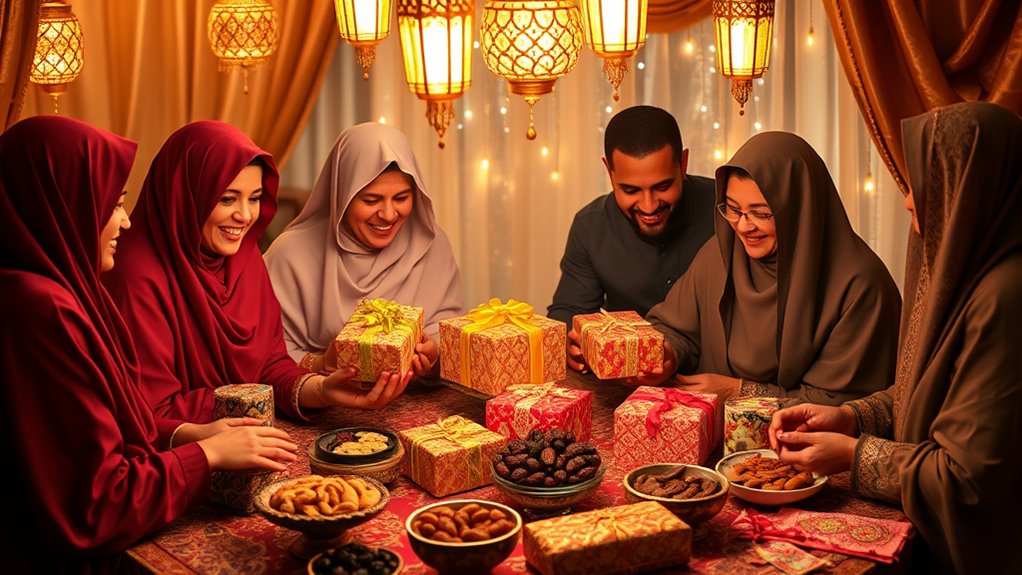During Ramadan and Eid, gift-giving is a meaningful tradition that celebrates love, gratitude, and community. You may exchange gifts like dates, clothing, or handmade crafts that symbolize blessings and respect. Many people also practice Zakat and Sadaqah to share wealth generously. Modern trends include eco-friendly packaging and digital gifts, all designed to strengthen bonds and honor cultural customs. Continue exploring to learn more about making your gifts truly impactful.
Key Takeaways
- Gift-giving during Ramadan and Eid symbolizes love, gratitude, and spiritual blessings, often involving traditional items like dates, clothing, and jewelry.
- Cultural and religious meanings influence gift choices, emphasizing modesty, prosperity, protection, and blessings.
- Community and family practices strengthen bonds through shared exchanges, personalized gifts, and thoughtful gestures.
- Modern trends include eco-friendly packaging, digital gifts, and tech gadgets, reflecting evolving lifestyles and values.
- Gift exchanges often occur during gatherings, with handwritten notes and elegant wrapping enhancing the significance of the gesture.
The Significance of Gift-Giving in Ramadan and Eid
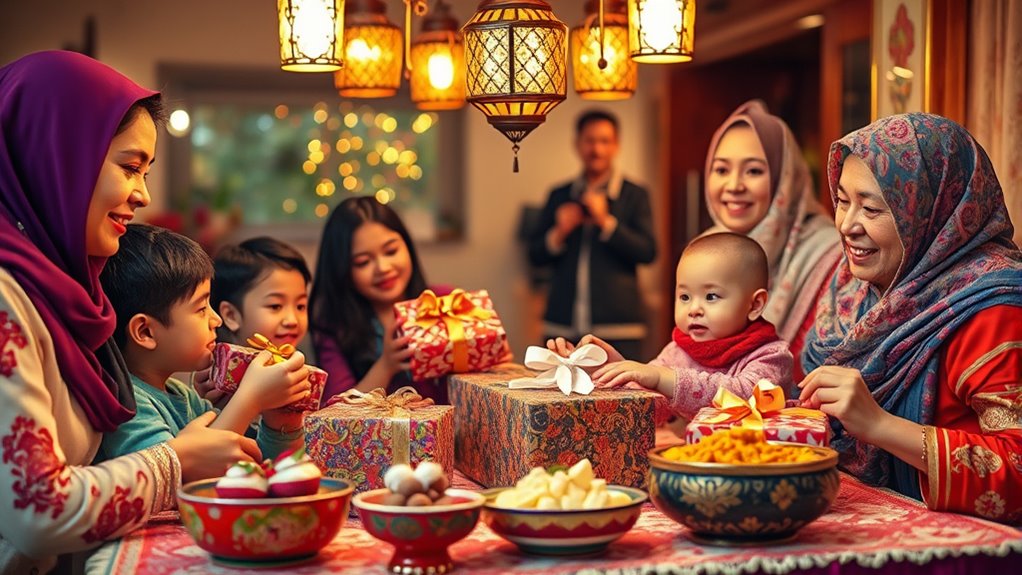
During Ramadan and Eid, gift-giving holds deep cultural and spiritual significance, serving as a way to express love, gratitude, and generosity. It’s a meaningful practice that often includes interfaith gift exchanges, fostering understanding and respect between different faith communities. By choosing eco-friendly gift options, you show care for the environment while celebrating tradition. These thoughtful gifts reflect your values and deepen connections with friends and family. The act of giving during these times emphasizes compassion and unity, transcending materialism. Whether sharing a small token or a meaningful gesture, your gifts symbolize goodwill and hope. Embracing eco-conscious choices and interfaith exchanges enhances the spirit of inclusivity, making your celebrations more mindful and impactful. Incorporating halal-certified products into your gift selections ensures that your giving aligns with your faith and ethical principles.
Traditional Gifts and Their Cultural Meanings
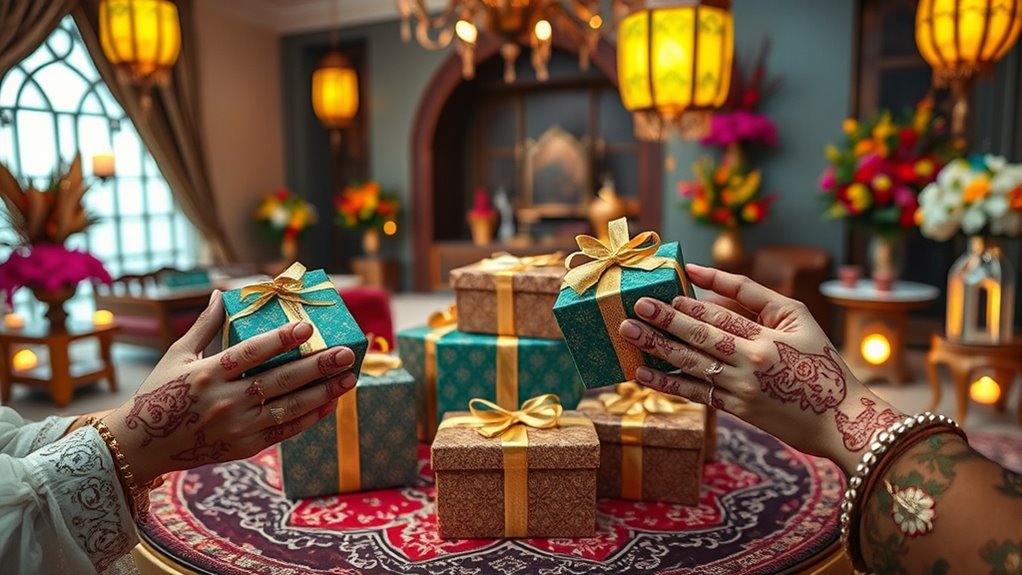
During Ramadan and Eid, the gifts you choose carry deep cultural meanings, often reflecting tradition and symbolism. You might give items like dates, jewelry, or clothing, each representing blessings, prosperity, or respect. Understanding these cultural significances helps you give gifts that truly honor the spirit of the celebrations.
Symbolic Gift Choices
Traditional gifts exchanged during Ramadan and Eid carry deep cultural significance, reflecting values of gratitude, charity, and community. Often, you’ll give symbolic tokens that embody these principles, such as small handcrafted items or meaningful charms. These gifts serve as ritual offerings, representing blessings, good luck, or spiritual growth. For example, giving a keychain or pendant with religious motifs symbolizes protection and faith. These symbolic tokens aren’t just decorative—they carry cultural meanings that reinforce bonds and shared values. When you select these gifts, you honor tradition and express your heartfelt wishes. The focus isn’t on material value but on the spiritual and cultural messages behind each offering, making your gesture more meaningful during this special time. Additionally, understanding the offensive security measures involved in safeguarding such cultural exchanges can enhance the significance of respectful gift-giving. Recognizing cultural sensitivities ensures that your gifts are appreciated and appropriate, respecting the traditions and beliefs of those receiving them. Incorporating eco-friendly glamping practices into your gift ideas can also symbolize a commitment to sustainability and environmental respect, aligning with the values often celebrated during Ramadan and Eid. Being mindful of recognizing and respecting cultural symbols further enriches the significance of your gifts, fostering mutual understanding and appreciation. Moreover, applying space and organization principles can help you thoughtfully select and present gifts, ensuring they are kept in meaningful and accessible ways.
Traditional Gift Items
Many cherished gift items carry deep cultural meanings during Ramadan and Eid, symbolizing blessings, prosperity, and spiritual growth. Common gifts include beautifully wrapped dates, luxurious perfumes, and elegant Eid fashion, reflecting respect and good wishes. Sharing Ramadan recipes as gifts fosters community and tradition, while giving stylish attire marks celebration and renewal. Here’s a glimpse of traditional gift items:
| Item | Cultural Meaning | Example Occasion |
|---|---|---|
| Dates | Nourishment and blessings | Breaking fast during Ramadan |
| Perfumes | Spiritual purity and elegance | Eid gifts |
| Eid Fashion | Renewal and celebration | Eid festivities |
| Decorative Items | Prosperity and good fortune | Home decorations during Eid |
These gifts deepen your connection, honor traditions, and showcase the beauty of the season. Additionally, understanding cultural meanings behind these gifts can enhance the significance of giving and receiving during this special time. Exploring the history of gift-giving can provide further insight into cultural practices and their evolution over generations. Recognizing the importance of traditions can help strengthen bonds and preserve cultural heritage through gift-giving. Incorporating traditional symbols into gifts can also add meaningful layers to the gesture. Embracing cultural diversity enriches the experience and fosters mutual respect during celebrations.
Cultural Significance
Have you ever wondered why certain gifts hold special cultural significance during Ramadan and Eid? These gifts often symbolize more than their material value, reflecting values like generosity, unity, and faith. For example:
- Dates and Sweets – Symbolize hospitality and the reward of patience, often given as interfaith gestures to foster understanding.
- Traditional Clothing – Represents cultural identity and respect, emphasizing the importance of heritage.
- Eco-Friendly Items – Highlight environmental considerations, promoting sustainable giving and caring for the planet.
- The choice of gifts can also be influenced by cultural significance, ensuring that giving aligns with shared beliefs and traditions.
- Additionally, understanding the drives behind gift choices can deepen the appreciation of these customs and their role in fostering community bonds.
These gifts carry deeper meanings, strengthening community bonds and honoring traditions. During Ramadan and Eid, giving thoughtfully chosen gifts shows respect for cultural heritage and shared values. It’s a meaningful way to celebrate, connect, and promote harmony across different backgrounds.
Creative Ideas for Ramadan and Eid Presents
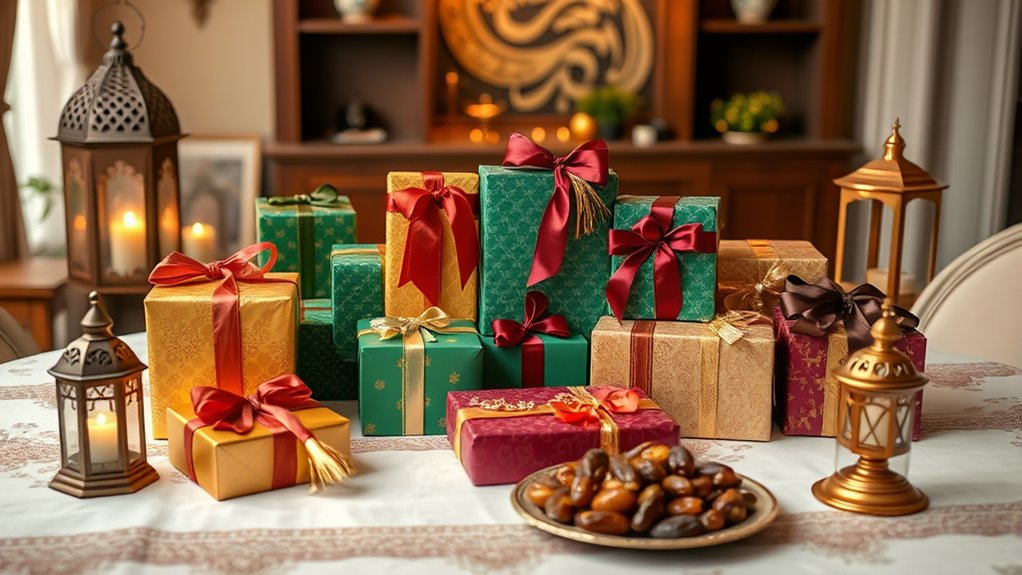
When choosing presents for Ramadan and Eid, thinking outside the box can make your gifts truly memorable. Consider creative ideas like beautifully decorated packaging with decorative wrapping that adds a special touch. Personalize your gifts with thoughtful notes that express your feelings and good wishes, making the recipient feel truly valued. Handmade items, such as custom jewelry or crafted Ramadan lanterns, also stand out as meaningful presents. You can gift a set of Ramadan-themed books or artisanal treats, wrapped carefully to enhance the presentation. Incorporate vibrant colors and elegant ribbons to elevate even simple gifts. Remember, the effort you put into presentation and personalization shows your care and makes your gift memorable beyond its material value. Additionally, selecting meaningful presents that reflect the recipient’s interests can deepen the significance of your gesture.
The Role of Zakat and Sadaqah in Gift-Giving

During Ramadan and Eid, zakat and sadaqah play an essential role in gift-giving by helping you share your blessings with those in need. These charitable donations are more than acts of kindness; they are crucial ritual practices that embody compassion and community spirit. Here are three ways they influence your giving:
- Fulfilling Religious Obligations: Zakat is a pillar of Islam, encouraging you to give a fixed portion of your wealth to those who need it most. Incorporating traditional practices can deepen the spiritual significance of your donations and reinforce cultural heritage.
- Enhancing Generosity: Sadaqah allows spontaneous donations, fostering ongoing charity beyond obligatory duties. Understanding payment processing ensures that your donations are securely and efficiently handled, reinforcing trust and transparency in your charitable efforts. Recognizing the importance of trust in charitable transactions can also encourage more consistent giving.
- Spreading Joy and Support: Your contributions help provide essentials like food, clothing, and financial aid, making a meaningful impact during festive seasons. Additionally, cultural heritage can serve as a guiding principle to enrich the intention behind your giving and connect it to longstanding traditions.
Community and Family Gift Exchange Customs
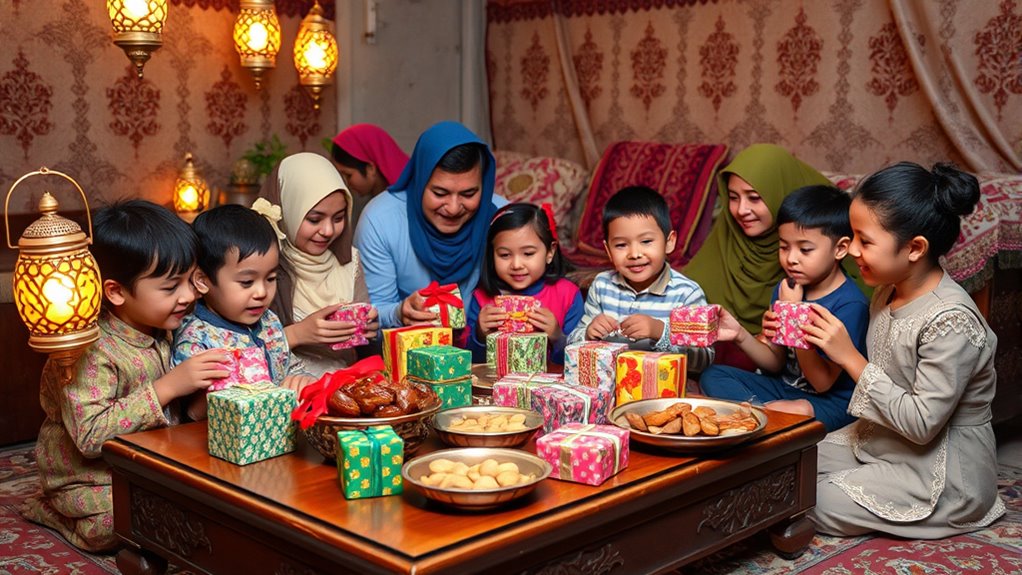
During Ramadan and Eid, exchanging gifts with family and community members strengthens bonds and celebrates togetherness. You’ll notice traditional practices like giving sweets, clothing, or small tokens that carry special meaning. These customs highlight the joy of sharing and create lasting memories during these festive times. Incorporating thoughtful gift ideas such as personalized items or cultural symbols enhances the spirit of giving. Recognizing the importance of community bonds during these celebrations further emphasizes how sharing gifts fosters unity and goodwill. Additionally, understanding air quality can play a role in making gatherings more comfortable and healthy for everyone, especially when using wood-burning stoves for warmth, which can impact indoor air pollution.
Traditional Gift-Giving Practices
Traditional gift-giving practices during Ramadan and Eid emphasize strengthening bonds within families and communities. You might notice these customs include thoughtful touches like:
- Using sustainable packaging to show care for the environment while wrapping gifts.
- Giving personalized gifts that reflect the recipient’s tastes, making the gesture more meaningful.
- Sharing small tokens of appreciation, such as handmade crafts or traditional sweets, to reinforce community ties.
These practices highlight the importance of intentionality and thoughtfulness. When you choose eco-friendly packaging or personalized items, you demonstrate respect for tradition and the environment. The focus remains on meaningful connections rather than material value, fostering a warm, inclusive atmosphere during these sacred celebrations.
Celebratory Exchange Customs
Celebratory exchange customs during Ramadan and Eid often center on communal and family gatherings, where giving and receiving gifts reinforce bonds and express good wishes. You’ll notice that greeting card etiquette plays a key role, with cards often conveying heartfelt messages. Gift wrapping traditions are also important, showcasing respect and care. When exchanging gifts, consider the following:
| Aspect | Tip |
|---|---|
| Greeting Cards | Keep messages respectful, warm, and culturally appropriate. |
| Gift Wrapping | Use elegant, modest wrapping that reflects the occasion. |
| Timing | Present gifts during family or community gatherings. |
| Personal Touch | Include a handwritten note to add sincerity. |
These customs strengthen community ties and highlight the spirit of generosity during Ramadan and Eid.
Modern Trends in Eid Gifting
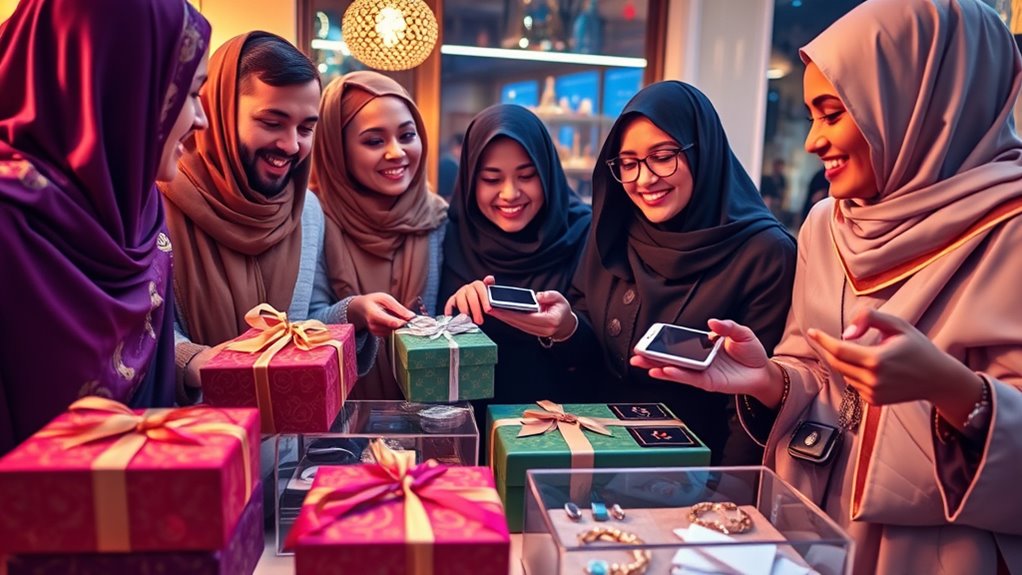
In recent years, Eid gifting has embraced modern trends that reflect changing preferences and lifestyles. You now see more personalized and innovative options, driven by digital innovations and eco-friendly packaging. Here are three trends shaping Eid gifts today:
- Digital innovations enable you to give virtual gifts, e-cards, or gift cards that can be personalized for each recipient.
- Eco-friendly packaging is becoming popular as you choose sustainable, biodegradable wrapping materials to reduce environmental impact.
- Smart gadgets and tech accessories are favored for their practicality and appeal to younger generations.
These trends make gifting more meaningful and aligned with contemporary values, helping you celebrate Eid thoughtfully while staying environmentally conscious.
The Impact of Gift-Giving on Social Bonds
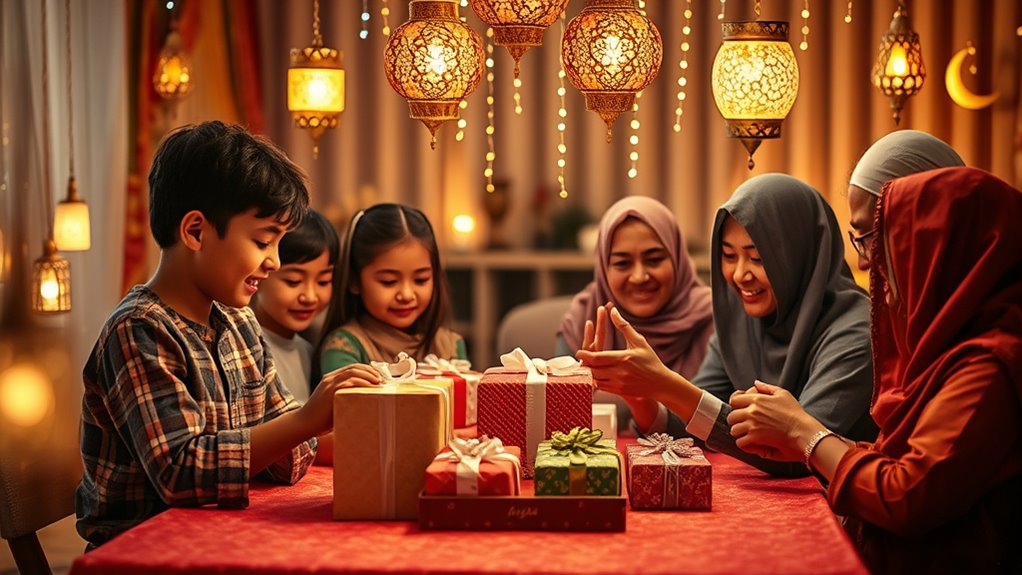
Gift-giving during Ramadan and Eid plays a powerful role in strengthening social bonds, as it fosters feelings of appreciation, trust, and community connection. By exchanging gifts, you actively enhance your interpersonal relationships, showing care and respect for others. This tradition encourages open communication and reinforces a sense of mutual support, which boosts social cohesion within your community. When you give thoughtfully, it signals your recognition of shared values and strengthens bonds that might otherwise weaken over time. These acts of generosity create a ripple effect, inspiring others to participate and deepen their own connections. Ultimately, gift-giving during these occasions isn’t just about the presents; it’s about nurturing relationships that sustain and enrich your social fabric.
Frequently Asked Questions
How Do Gift-Giving Customs Vary Across Different Muslim Cultures?
You’ll notice that gift-giving customs vary widely across Muslim cultures, reflecting deep cultural variations and ritual significance. In some societies, giving modest presents like clothes or sweets symbolizes goodwill and respect, while others emphasize elaborate offerings during special occasions. These differences highlight how traditions adapt to local customs and beliefs, making every culture’s approach unique yet meaningful in celebrating shared faith and community bonds.
Are There Specific Restrictions on Types of Gifts During Ramadan and Eid?
Managing the delicate sphere of gift-giving, you should consider cultural sensitivities and gift wrapping etiquette during Ramadan and Eid. While no strict restrictions exist, it’s respectful to avoid gifts that could be deemed inappropriate or offensive, such as alcohol or pork products. Opt for thoughtful, modest items, and present them with simple, elegant wrapping. This shows your genuine respect and understanding of the cultural nuances, making your gesture meaningful.
How Can I Respectfully Give Gifts to Someone of a Different Faith?
When you want to give gifts to someone of a different faith, focus on interfaith dialogue and cultural sensitivity. Respect their beliefs by choosing thoughtful, neutral presents that celebrate friendship and understanding rather than religious symbols. Be mindful of their customs and ask if you’re unsure. This approach shows your genuine respect and fosters connection, making your gesture meaningful and appreciated while honoring their traditions.
What Are Eco-Friendly or Sustainable Gift Options for Eid?
Thinking of thoughtful, eco-friendly Eid gifts? Consider choosing handmade presents that highlight heartfelt craftsmanship, reducing reliance on mass-produced items. Opt for items in recyclable packaging to minimize waste and promote sustainability. You might also gift reusable products like eco-friendly water bottles or cloth bags. These gifts demonstrate your dedication to the environment while spreading joy and kindness during Eid, making celebrations more meaningful and mindful.
How Do Gift-Giving Practices Change for Children Versus Adults?
When it comes to gift-giving practices, you typically choose child-focused gifts like toys, books, or educational items for children, making the experience fun and memorable for them. For adults, you consider their preferences, such as personalized items, luxury goods, or meaningful keepsakes. You adapt your approach by selecting age-appropriate and thoughtful gifts, ensuring that each recipient feels appreciated and valued during special occasions.
Conclusion
As you immerse yourself in the world of Ramadan and Eid gift-giving, you’re not just exchanging presents—you’re weaving a tapestry of love, generosity, and tradition that could rival the stars in the night sky. Every gift, big or small, has the power to strengthen bonds, ignite joy, and transform moments into lifelong memories. So go ahead—give with an open heart and watch your connections grow stronger than ever before!
